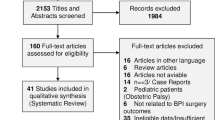Abstract
Background
The aim of this study was to investigate outcomes after surgery for brachial plexus injury (BPI), not only motor outcomes but also the quality of life of the patients.
Methods
We operated on 128 consecutive patients with BPI from 1992 to 2012. We documented the information on the injured nerve, level of injury, type of treatment used, timing of surgery, patient age, and preoperative and postoperative motor deficits. In 69 patients who agreed to participate in a quality of life study, additional assessments included functionality, pain, quality of life, patient satisfaction, and psychosocial health.
Results
Of patients who underwent only exploration and neurolysis, 35.3% showed a good quality of recovery. Patients who underwent nerve reconstruction using nerve grafting showed a better rate of good quality recovery (56.7%), and the results following nerve transfer depended on the type of transfer used. After surgery, 82.6% of patients showed significant improvement, 82.6% were satisfied, and 81.2% responded positively when asked if they would undergo surgery again if they knew the current result beforehand. Overall, 69.6% patients continued working after surgery. The mean DASH disability score was high (58.7) in the study group. Patients who had early surgery showed a consistently higher DASH score. About 76% of patients reported having pain regularly, and 18.8% reported depression or anxiety.
Conclusions
We consider that it is important to report not only muscle recovery, but also other aspects of recovery.

Similar content being viewed by others
References
Choi PD, Novak CB, Mackinnon SE, Kline DG (1997) Quality of life and functional outcome following brachial plexus injury. J Hand Surg Am 22:605–612
Dolan RT, Butler JS, Murphy SM, Hynes D, Cronin KJ (2011) Health-related quality of life and functional outcomes following nerve transfers for traumatic upper brachial plexus injuries. J Hand Surg Eur Vol 37:642–651
Holdenries M, Schenck TL, Akpaloo J, Muller-Felber W, Holzbach T, Giunta RE (2013) Quality of life after brachial plexus lesions in adults. Handchir Mikrochir Plast Chir 45:229–234
Kim D, Midha R, Murovic J, Spiner R (2008) Kline and Hudsons: nerve injuries. Saunders, Philadelphia
Kretschmer T, Ihle S, Antoniadis G, Seidel J, Heinen C, Borm W, Richter H, Konig R (2009) Patient satisfaction and disability after brachial plexus surgery. Neurosurgery 65:189–196
National Center for Health Statistics (1997) National Health Interview Survey (DHHS Publication No. PHS 2000–1530). U.S. Government Printing Office, Washington, pp 2000:8
Author information
Authors and Affiliations
Corresponding author
Ethics declarations
Funding
No funding was received for this research.
Conflict of interest
All authors certify that they have no affiliations with or involvement in any organization or entity with any financial interest (such as honoraria; educational grants; participation in speakers’ bureaus; membership, employment, consultancies, stock ownership, or other equity interest; and expert testimony or patent-licensing arrangements), or non-financial interest (such as personal or professional relationships, affiliations, knowledge or beliefs) in the subject matter or materials discussed in this article.
Ethical approval
All procedures performed in studies involving human participants were in accordance with the ethical standards of the institutional and/or national research committee and with the 1964 Declaration of Helsinki and its later amendments or comparable ethical standards.
Informed consent
Informed consent was obtained from all individual participants included in the study.
Additional information
Comments
This study of patients at a single center undergoing brachial plexus surgery attempts to study not only recovery of motor function but also other important experiences of patients such as residual disability, satisfaction with the surgery, amount of residual pain, and willingness to undergo the surgery if the outcome is known. These are very important aspects to study, and this study represents an important step in this direction.
Michel Kliot
California, USA
Rights and permissions
About this article
Cite this article
Rasulić, L., Savić, A., Živković, B. et al. Outcome after brachial plexus injury surgery and impact on quality of life. Acta Neurochir 159, 1257–1264 (2017). https://doi.org/10.1007/s00701-017-3205-1
Received:
Accepted:
Published:
Issue Date:
DOI: https://doi.org/10.1007/s00701-017-3205-1




